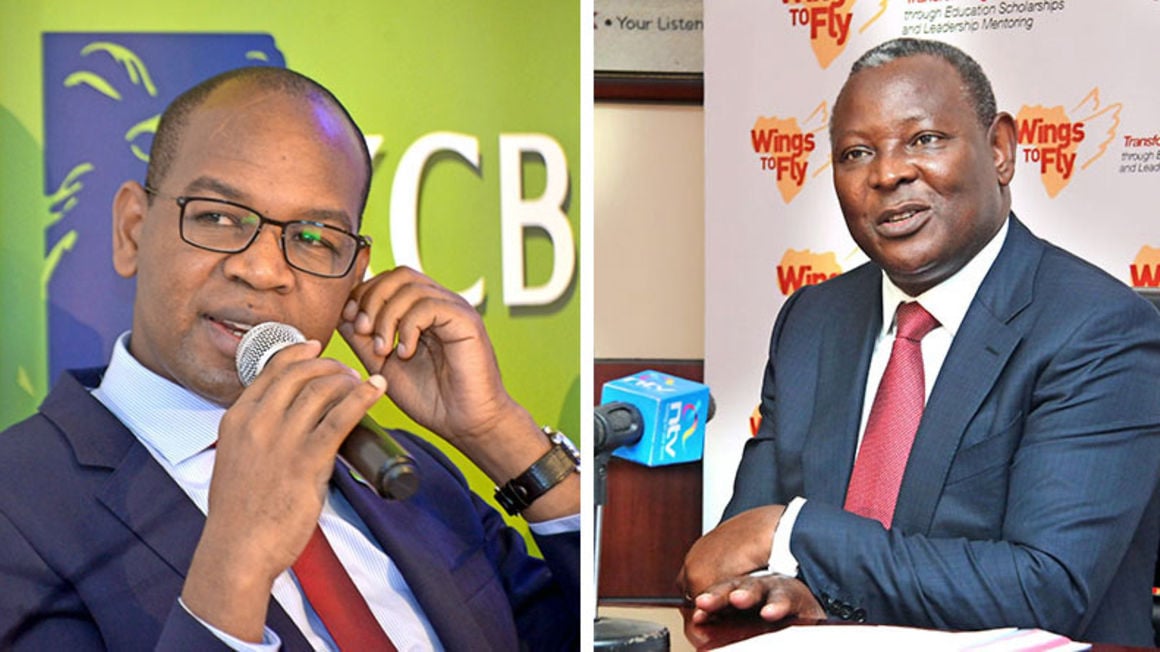
KCB chief executive Joshua Oigara (left) and Equity chief executive James Mwangi. FILE PHOTOS | NMG
Summary
- CBK data shows that lending rates fell to an average of 11.75 percent in September following a consistent drop in the regulator’s benchmark lending rate.
- This is the lowest average lending rate since the CBK started disclosing the rate in July 1991 during the reign of the then Moi-era governor Eric Kotut and matches annual borrowing costs disclosed by the World Bank in 1980.
- Top banks such as KCB and Equity Group are expecting repeat requests for loan restructurings and are projecting up to three years for the Covid-19 economic difficulties to clear out.
Banks have cut the cost of credit to levels last seen in the early 1980s and reduced appetite to extend credit to high-risk borrowers in the wake of the Covid-19 pandemic that has raised defaults to a 13-year high.
Latest Central Bank of Kenya (CBK) data shows that lending rates fell to an average of 11.75 percent in September following a consistent drop in the regulator’s benchmark lending rate.
This is the lowest average lending rate since the CBK started disclosing the rate in July 1991 during the reign of the then Moi-era governor Eric Kotut and matches annual borrowing costs disclosed by the World Bank in 1980.
The drop has eased fears of a rise in the cost of credit after the removal of the interest rate cap last November following pressure from banks and the International Monetary Fund (IMF).
The removal of the legal cap led to fears of a likely return to the era of high cost of loans, which had at one point hit 25 percent.
The CBK has reduced its benchmark rate from nine percent in November last year to the current seven percent, arguing that the economy was operating below potential amid the economic fallout triggered by the Covid-19 pandemic.
This means that banks are lending at 4.74 percentage points above the CBK rate, which is slightly higher than the 4.0 percentage points that applied when the government-imposed cap was effective.
However, banks are taking a cautious approach in extending fresh credit in an environment where companies and individuals are increasingly seeking moratorium on their loans in the wake of the public health crisis.
Industries and other businesses have since cut down on their activities in response to the pandemic, leading to job cuts and unpaid leave for retained staff as profitable firms move into losses.
This has seen workers who had tapped mortgages and unsecured loans for purchase of goods such as furniture and cars and expenses like school fees default.
Unsecured loans are given on the strength of one’s salary. Firms that had borrowed based on the forecast of cash flows have also been struggling to repay their bank loans.
Banks had started lending to the private sector at an increasing pace since the removal of the interest rate cap in November but the momentum slowed in the wake of Covid-19.
Private sector credit grew by 7.3 percent in the years to September, the slowest since Kenya announced its first case of Covid-19 in March 12 and below the ideal rate of 12-15 percent needed to support economic growth.
The CBK allowed banks to restructure loans and reschedule payments for customers suffering under the pandemic ever since Covid-19 first hit Kenya.
The banks have restructured customer loan facilities worth more than Sh1 trillion to cushion borrowers from the impact of the pandemic.
Top banks such as KCB and Equity Group are expecting repeat requests for loan restructurings and are projecting up to three years for the Covid-19 economic difficulties to clear out.
KCB chief executive Joshua Oigara said customer profile in areas such as hotels, aviation, transport and education has been hurt and this is going to take longer to recover.
"We see a deterioration in credit quality across segments and some businesses will not be able to come out of this pandemic with the ability to honour obligations," said Mr Oigara.
KCB raised loan loss provision 3.4 times to Sh20 billion while that of Equity Bank jumped 7.8 times to Sh14.7 billion in appreciation of the challenges that businesses and households are grappling with due to Covid-19 disruptions.
The ratio of non-performing loans (NPLs) has also risen from March’s 12.5 percent to 13.6 percent in August -- the highest since August 2007 when it stood at 14.41 percent.
Equity CEO James Mwangi said the lender had turned to credit guarantees so that it does not suffer losses in case some of the businesses with loans collapse and their security fails to cover the entire loan.
"Because we can’t guarantee whether these businesses will bounce back after three years, we did a credit guarantee so that whatever the security will not cover or we are unable to sell, we call the guarantee," he said.





No comments :
Post a Comment